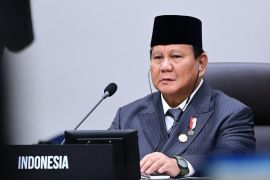The economic toll on women from caregiving averages around US$300 thousand over a lifetime. By predominantly assigning caregiving responsibilities, both paid and unpaid, to women, we curtail their economic participation and perpetuate gender bias.Jakarta (ANTARA) - APEC, through its Human Resources Development Working Group (HRDWG), has introduced a policy toolkit to address the gap in unpaid care in the region, recognizing the significant and disproportionate share of unpaid work assumed by women.
According to the APEC Policy Support Unit, women across APEC shoulder about three times more hours of unpaid care and domestic work compared to men.
The International Labour Organization (ILO) estimates that the value of unpaid care and domestic work accounts for as much as 9 percent of the global gross domestic product (GDP), or around US$11 trillion, the APEC HRDWG said in a release received here on Friday.
"Care forms the bedrock upon which all other work is built, yet it is frequently undervalued and underpaid," HRDWG's lead shepherd Zhao Li said.
"Investing in care infrastructure not only bolsters economic growth and the workforce, but also embodies the APEC HRDWG Detroit Principles and Recommendations," Li added.
"The economic toll on women from caregiving averages around US$300 thousand over a lifetime. By predominantly assigning caregiving responsibilities, both paid and unpaid, to women, we curtail their economic participation and perpetuate gender bias," he added, highlighting the importance of the toolkit in contributing to the global discussion on unpaid care and inclusion.
The APEC Embracing Carers Policy Toolkit to Address the Unpaid Care Gap recognizes that supporting unpaid carers is impossible without recognizing linkages to the broader care economy and the role of paid caregivers.
It also explores the diverse experiences among those providing unpaid care across APEC member economies.
The toolkit underlines the need for more robust, consistently generated data on unpaid caregiving, particularly in the wake of the pandemic's social and economic effects.
While economists have captured some of the economic costs of unpaid care work, substantial data on social or welfare costs of caregiving — which includes changes to carers' well-being and lost leisure time — is scarce.
An expert advisory group comprising 45 members from the government, private sector, multilateral organizations, and civil society and representing 15 APEC economies was established to provide insights for drafting the toolkit.
Its members included experts from the ILO, World Bank, UN Women, Asian Development Bank, and EMD Serono, bringing expertise ranging from childcare to long-term care.
The toolkit is part of a broader initiative of APEC Embracing Carers, which aims to raise awareness of the economic implications of unpaid care; provide evidence-based solutions to support and empower unpaid carers in the APEC region; address this significant barrier to greater women's economic empowerment as well as to improve health outcomes for women across APEC.
"Caregiving is one of the situations where any one of us will have to do at a time of our life, be it your parents or your children, or both at the same time," said Terri Stewart, senior vice president and head of global healthcare, government, and public affairs for EMD Serono, the private sector lead of the expert advisory group.
"To support greater inclusion of women in the economy, we need to work together to integrate unpaid care in policymaking, thinking of how certain policies will impact caregivers and their ability to participate and contribute to the economy," Stewart added.
Incorporating the model of action-oriented policy objectives developed by the ILO — recognize, reduce, redistribute, reward, represent, and reframe — the toolkit seeks to provide a foundational framework for policymakers to choose policies that support unpaid carers and that respond to economy-specific contexts and serve as a critical first step to recognizing and supporting the care economy in its entirety.
Related news: APEC growth outlook brightens, but risks linger
Related news: APEC drives quality economic growth agenda
Reporter: Yuni Arisandy Sinaga
Editor: Rahmad Nasution
Copyright © ANTARA 2024











